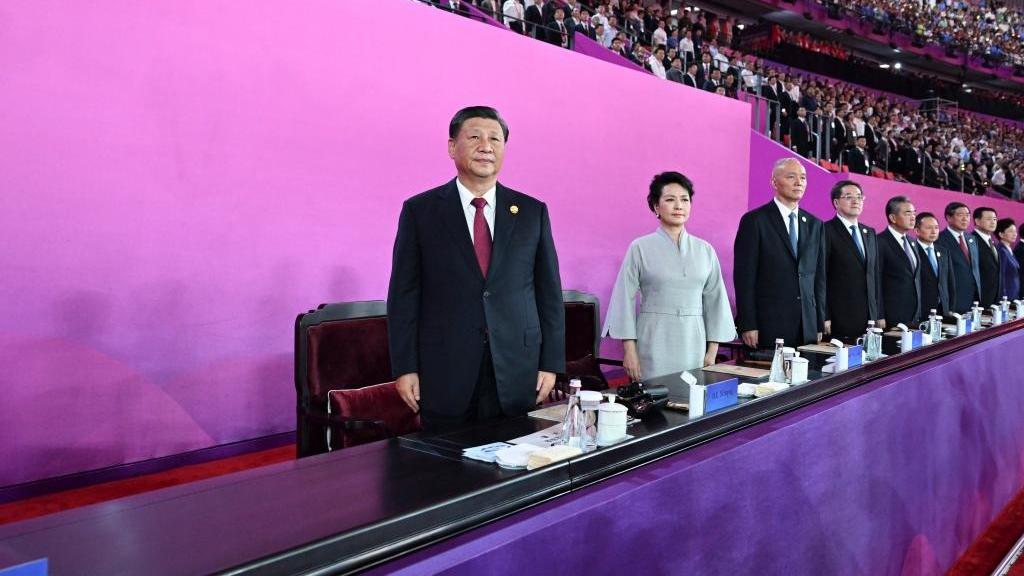Leaders, scholars hail commitment by China to amity, global prosperity
 Party and state leaders Xi Jinping, Cai Qi and Ding Xuexiang attend the opening ceremony of the 19th Asian Games in Hangzhou, capital city of east China's Zhejiang province, Sept 23, 2023. (PHOTO / XINHUA)
Party and state leaders Xi Jinping, Cai Qi and Ding Xuexiang attend the opening ceremony of the 19th Asian Games in Hangzhou, capital city of east China's Zhejiang province, Sept 23, 2023. (PHOTO / XINHUA)
China's tangible commitment to world peace, unity and prosperity were noted by global leaders as they endorsed Beijing's latest diplomatic efforts led by President Xi Jinping amid the ongoing Hangzhou Asian Games.
The 19th Asian Games, which opened on Saturday night, are the largest and highest-level comprehensive international sports event organized by China since the conclusion of the 20th National Congress of the Communist Party of China in 2022.
As more than 12,000 athletes from 45 Asian countries and regions have gathered in scenic Hangzhou, the capital of East China's Zhejiang province, so have a number of world leaders and representatives of international organizations.
At the welcoming banquet held on Saturday for the Games' opening, President Xi noted that the day was the autumn equinox, a day of harvest and reunion known as Qiufen on the Chinese lunar calendar.
"As a community with a shared future connected by mountains and rivers as well as cultural affinity, we should use sports to promote peace, pursue good neighborliness and mutual benefit, and reject Cold War mentality and bloc confrontation," he said.
"We should make Asia an anchor of world peace," he added.
Noting that the ongoing Games have set a record for the number of registered athletes and events, Xi said, "We should use sports to promote unity." He called for efforts to "open up broader prospects for the Asian road toward common development, openness and integration".
"We should use sports to promote inclusiveness, enhance confidence in our civilizations, pursue exchanges and mutual learning, and renew the glory of Asian civilizations," he added.
Scholars said that China's hosting of the Asian Games aims to use sports "to advance peace, shore up unity and bolster inclusiveness", and that the latest sports diplomacy led by Xi has been a success.
Xiao Jianzhong, a professor at the School of Marxism of Zhejiang University of Technology, said, "For China, the Hangzhou Asian Games not only are a major sporting event, but also serve as an important event for diplomacy rolled out at home, as well as an important stage for exchange among various civilizations in Asia."
From Friday to Saturday in Hangzhou, Xi embarked on a number of bilateral meetings with the visiting Asian leaders of six nations and the heads of the Olympic Council of Asia and the International Olympic Committee.
The meetings with the prominent figures took place at a State guesthouse at West Lake, a scenic tourist destination in Hangzhou.
As this year marks the 10th anniversary of Xi's proposing the concept of China seeking "amity, sincerity, mutual benefit and inclusiveness" with its neighbors, the president referred on Saturday to this principle during his talks with foreign leaders.
Speaking with Cambodian King Norodom Sihamoni, Xi said that China-Cambodia relations epitomize this principle, and he noted China's commitment to good-neighborliness and partnership with its neighbors in its diplomacy in the region.
The king hailed the two-way ironclad, brotherly relations, saying that his country stands ready to work with China on Belt and Road cooperation and build a Cambodia-China community with a shared future.
IOC President Thomas Bach told Xi on Friday, "I believe there will be successful and wonderful Asian Games that will promote the unity and friendship of Asia."
He said the IOC is committed to safeguarding the nonpoliticization of sport, which is broadly supported by the world community, and it endorses China's correct position on this.
Crown Prince of Kuwait Sheikh Mishal Al-Ahmad Al-Jaber Al-Sabah said President Xi's proposals to build on the Belt and Road Initiative, Global Development Initiative, Global Security Initiative and Global Civilization Initiative are "based on the noble goals and tenets of promoting the peace and progress of mankind", which Kuwait firmly supports and actively participates in.
Observers noted that Beijing's consistent pursuit of world prosperity and peace could also be seen in two joint statements released following Xi's talks with Syrian President Bashar al-Assad and with Timor-Leste's Prime Minister Xanana Gusmao on Friday and Saturday, respectively.
In the two statements, China announced the establishment of a strategic partnership with Syria and a comprehensive strategic partnership with Timor-Leste.
Co-building the Belt and Road as well as a community with a shared future for mankind, bolstering local livelihoods and "jointly advancing genuine multilateralism" in the international arena are among common points of consensus noted in the two statements.
Ma Xiaolin, a professor and director of Zhejiang International Studies University's Institute for Studies on the Mediterranean Rim, said China, as a major developing country and the world's second-largest economy, "has never forgotten its social responsibility as a major country in Asia and the world".
The Hangzhou Asian Games are the city's "biggest stage to showcase China's image to the outside world and to promote face-to-face exchanges among people from all countries" since Hangzhou hosted the G20 Summit seven years ago, he said.
Yasir Habib Khan, a writer for The Nation, Pakistan's leading newspaper, noted that cricket's return to the Asian Games and its inclusion in the Hangzhou events "is a pivotal moment for the sport and for China's diplomatic endeavors", as teams of both Pakistan and India now may have the chance to embark on friendly rivalry at the games.
The inclusion of cricket in the Asian Games "showcases China's commitment to using sports as a bridge for international engagement and cooperation", he wrote.
The Asian Games in Hangzhou serve as "testament to the power of sports to unite nations, break down barriers, and craft a shared narrative of friendship and cooperation on the global stage", he added.


